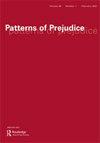经济发展、对移民的态度和(缺乏)帮助难民的意愿:来自奥罗拉人道主义指数的见解
IF 0.8
2区 社会学
Q4 ETHNIC STUDIES
引用次数: 0
摘要
在这篇论文中,雅各布斯使用来自奥罗拉人道主义指数调查项目的12个国家的数据集,研究了对移民的态度、与移民相关的感知威胁和(缺乏)帮助难民的意愿之间的联系。感觉到的种族威胁(经济、文化或宗教)越高,个人就越不愿意为难民动员起来。除了个人层面的模式外,我们还通过相关和多层次分析研究了国家特征(国内生产总值(GDP)、移民数量等)的影响。虽然移徙者的比例和难民的比例都不会影响动员起来帮助难民的意愿,但经济情况确实有影响。在富裕国家,人们不太愿意提供帮助。此外,我们可以观察到,在富裕国家(GDP较高的国家),反对移民和认为难民构成经济威胁的影响都加剧了。本文章由计算机程序翻译,如有差异,请以英文原文为准。
Economic development, attitudes towards migration and the (lack of) willingness to help refugees: insights from the Aurora Humanitarian Index
ABSTRACT In this paper Jacobs examines the connection between attitudes on migration, perceived threats linked to migration and the (lack of) willingness to help refugees using a data set of twelve countries from a survey project called the Aurora Humanitarian Index. The higher the perceived ethnic threat (economic, cultural or religious), the less willing individuals are to mobilize for refugees. In addition to patterns on the individual level, we examine the impact of country characteristics (gross domestic product (GDP), number of migrants and so on) through correlational and multilevel analysis. While neither the proportion of migrants nor the proportion of refugees impacts on the willingness to mobilize in favour of refugees, the economic situation does have an effect. In richer countries there is less willingness to help. Furthermore, we can observe that the effect of both opposition to migration and the perception of refugees as posing an economic threat is exacerbated in richer countries (countries with a higher GDP).
求助全文
通过发布文献求助,成功后即可免费获取论文全文。
去求助
来源期刊

Patterns of Prejudice
Multiple-
CiteScore
2.50
自引率
0.00%
发文量
11
期刊介绍:
Patterns of Prejudice provides a forum for exploring the historical roots and contemporary varieties of social exclusion and the demonization or stigmatisation of the Other. It probes the language and construction of "race", nation, colour, and ethnicity, as well as the linkages between these categories. It encourages discussion of issues at the top of the public policy agenda, such as asylum, immigration, hate crimes and citizenship. As none of these issues are confined to any one region, Patterns of Prejudice maintains a global optic, at the same time as scrutinizing intensely the history and development of intolerance and chauvinism in the United States and Europe, both East and West.
 求助内容:
求助内容: 应助结果提醒方式:
应助结果提醒方式:


